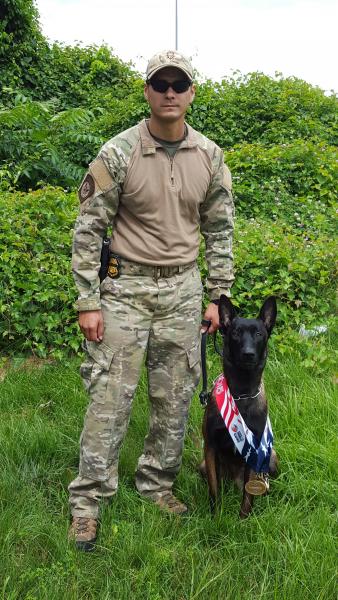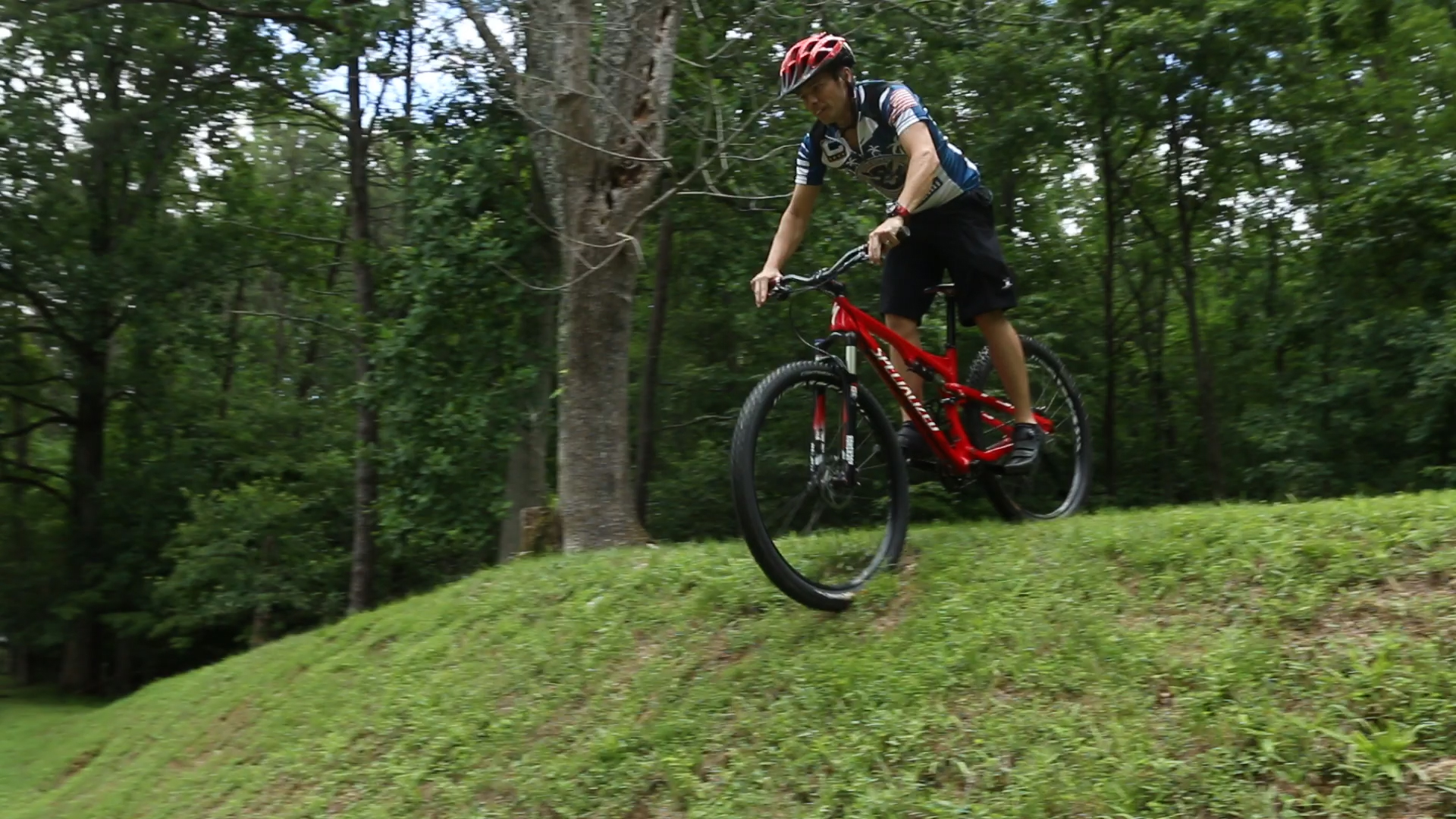
CBP Makes its Mark
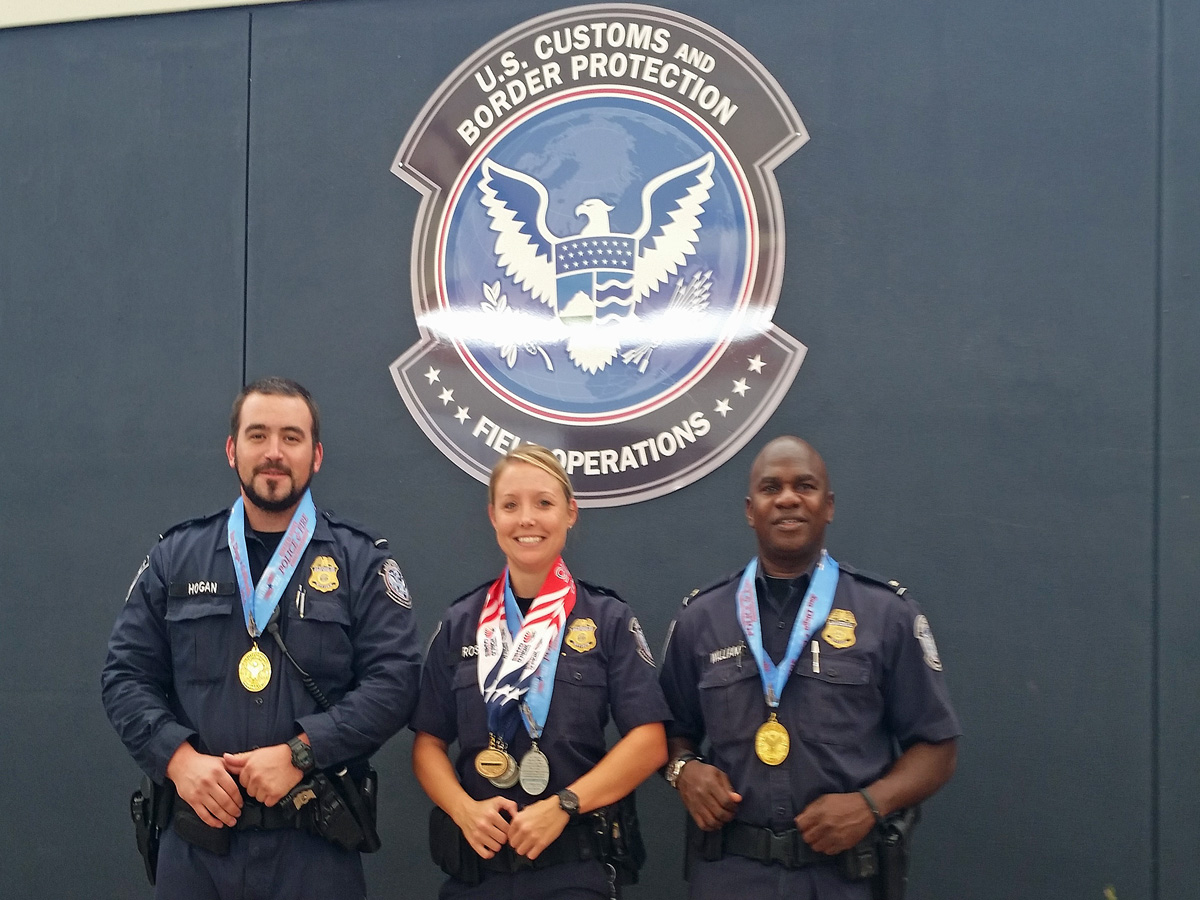
For 10 days this summer, police, firefighters and other first responders got an opportunity to clash in friendly competition in sports as diverse as bowling, golf, angling, badminton and stair climbing--or as traditional as martial arts, shooting and weight lifting.
More than 60 different events drew approximately 10,000 athletes from 68 nations to a sports extravaganza that rivals the summer Olympics. The World Police & Fire Games is held every two years. Previous venues were Dubai, Vancouver and Dublin. This year the event took place in locations throughout Fairfax and Prince William Counties in Northern Virginia. The games move to Montreal in 2017.
With scores of participants U.S. Customs and Border Protection played no small role in the big contest that lasted from June 25 to July 5.
Over the hills and through the dirt
In the woods, it’s you and your bike against the trees, ruts, roots, rocks and ravines. Staying clear of those potential bone breakers is what mountain bikers do best, says Juan “Pico” Traversone, who traveled from Ft. Lauderdale, Florida, to face the Virginia wilderness.
For one day, Fountainhead Regional Park in Fairfax Station, this usually tranquil reserve, buzzed with activity. Music blared from a portable public address system, interrupted every few minutes as an announcer recognized a rider swooping past the finish line, a roped off grassy patch. Large red numbers on a digital scoreboard mounted next to the final crossing displayed the time.
Mingling mountain bikers from the Brasilia City Police, Los Angeles Fire Department, Toronto Fire Services, Royal Malaysian Police Service, the Texas State Parks and Wildlife Service and many more locations, gave the park an Olympic feel.
CBP Officer Traversone, 43, who works at Miami International Airport, competed against 29 other mountain bikers in the 40-44 age division.
“I’m the old man on the team,” he said.
Divisions were staggered by five-year increments starting at age 20. Traversone placed better than half—15th, completing a heart-pounding two laps along the twisting trail in an hour and 38 minutes. That’s more than 12 miles of high-octane pedaling and spilt-second turns.
“The idea is to travel as fast as you can through the woods, zigzagging through the trees without hitting anything,” he said.
But the hills hit him like a brick wall. “There’s nothing in Florida to prepare you for Virginia,” he said. “The hills here killed me.”
Mountain biking is Traversone’s passion. How else would you explain why someone would leave home at 5 a.m., drive four hours to Ocala, Florida, traverse the trails for four hours and then drive back? All in one day! He also competes in the Florida Police and Fire Games and makes it a point to ride his mountain bike off-road each week. In just three years, Traversone put 1,800 miles on his custom cruiser.
Serious mountain bikes don’t come cheap: About $3,000, he said. But Traversone invested about another $3,000 in top-end components—better gears, hydraulic disc brakes, faster shifter, wider tires—to gain every competitive advantage. With all the custom upgrades, Traversone calls his bike “a piece of art.”
While the object of the mountain biking competition was fun and camaraderie, there were still a few riders crossing the finish muddied and bloodied.
“There’s definitely an element of danger in this sport,” Traversone admits.
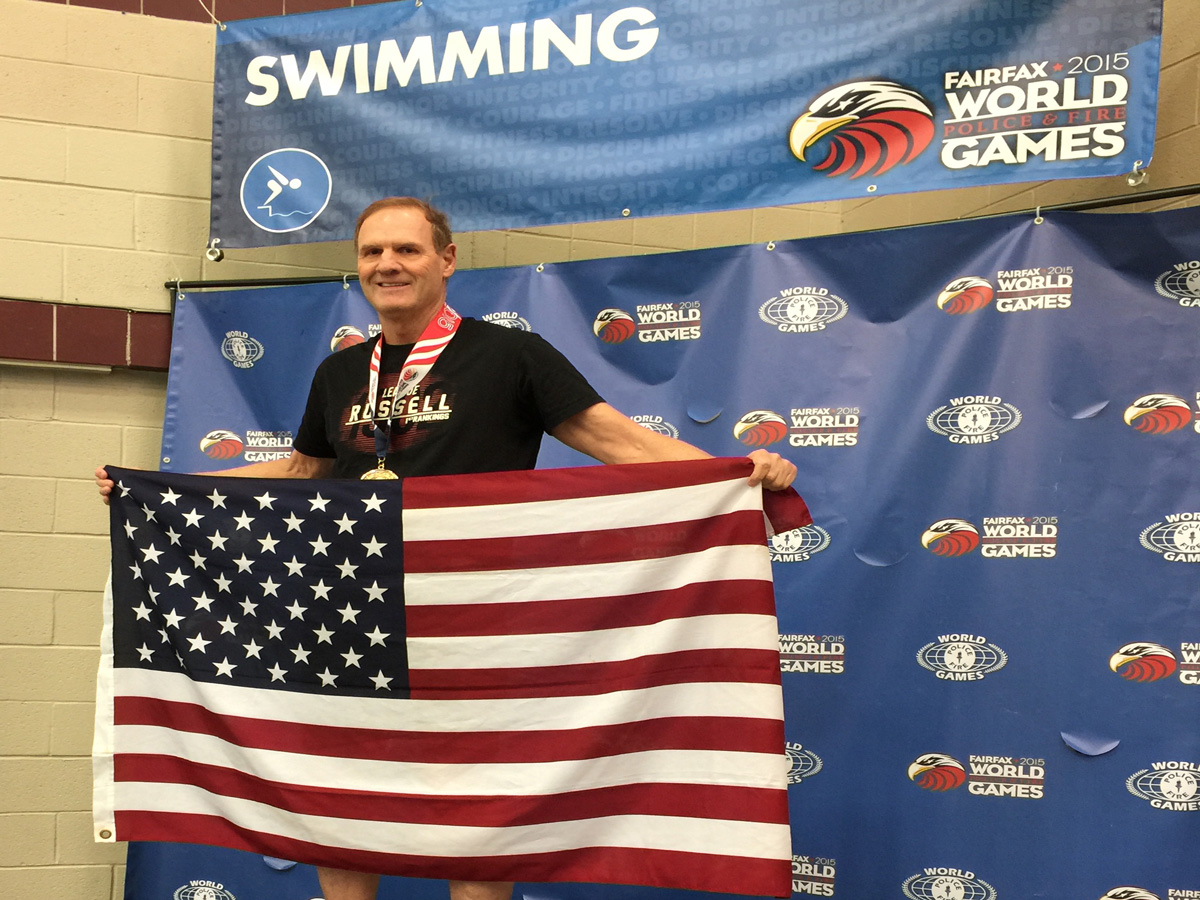
Running and rowing, the Lukeville Three pursue their passions
Crysti Rose relishes a challenge—like running 10 kilometers in under an hour, roughly 56 minutes. That blistering pace won her a gold medal in the women’s 10K, 30-34 age, heavyweight division. The course was a true challenge for the CBP officer from Port of Lukeville, Arizona. It snaked through woods, over grass, on pavement, over a creek and even through mud.
“The last few miles were the toughest, there were lots of hills and it was humid,” said Rose. The course was unlike the arid and desolate Organ Pipe Cactus National Monument where she sometimes trains.
Surprisingly, Rose also won a silver medal—two awards for the same event. The rules allowed her to compete individually and as a team. During the race, she joined a team with two female Hong Kong police officers. Their average time was computed and matched against other three-contestant teams in the 10K run.
Rose, 31, also came within seconds of a bronze medal in rowing when she and fellow Lukeville officer Sean Hogan teamed up for the 1,000-meter rowing competition. Instead, they placed fourth in the 18-30 age division. “If we duplicated our 1-minute, 29-second record we set in San Diego, we would have placed in Fairfax,” said Hogan, 27.
San Diego hosted the National Police & Fire Games about a month earlier, where Hogan and Rose won a gold medal in the 1,000-meter event. In an individual rowing competition against four other women in her division, Rose snagged a silver medal in San Diego and Fairfax rowing 2,000 meters in eight minutes.
Hogan, who grew up in Fairfax and has been with CBP for three years, also competes in weightlifting events. His record is 335 pounds for the bench press and 540 pounds for the deadlift.
Rose also participates in the CBP honor guard and is an emergency medical technician. She completed a couple of marathons during her 10 years of running, but especially enthuses in an event called Go Ruck. Typically, it’s a group of hikers who trek about 30 miles with heavy backpacks, mostly at night. On the go for up to 14 hours throughout the night and into the morning hours, the grueling event takes participants through parks and urban environments.
Lukeville CBP Officer James Williams also excelled in the San Diego games, capturing a gold medal by scoring first place in 100- and 200-meter sprints. He competed in the same events at the 2015 World Games, and while not placing in the top three, Williams was still pleased with the results.
He should be. Of the 28 runners, Williams placed fifth in both events. However, many of those contestants trained for years, some even had coaches, he said. None of those resources were available to the Lukeville Three, and while they worked out regularly, they were only able to commit to the Fairfax games just 10 days before the event.
Williams, 41, competed in the 40-44 age division and had to excel in several qualifying heats before running in the finals.
Staying in shape in Lukeville takes determination. There are no gyms in the hamlet and the nearest municipal area is 40 miles away. “You have to find ways to workout, even on the street,” said Williams, a six-year CBP veteran.
Williams also has been doing quite a mental workout. He holds a bachelor’s degree in social science, a master’s degree in administrative justice and is working on his dissertation for a doctorate in public policy with a concentration in criminal justice.
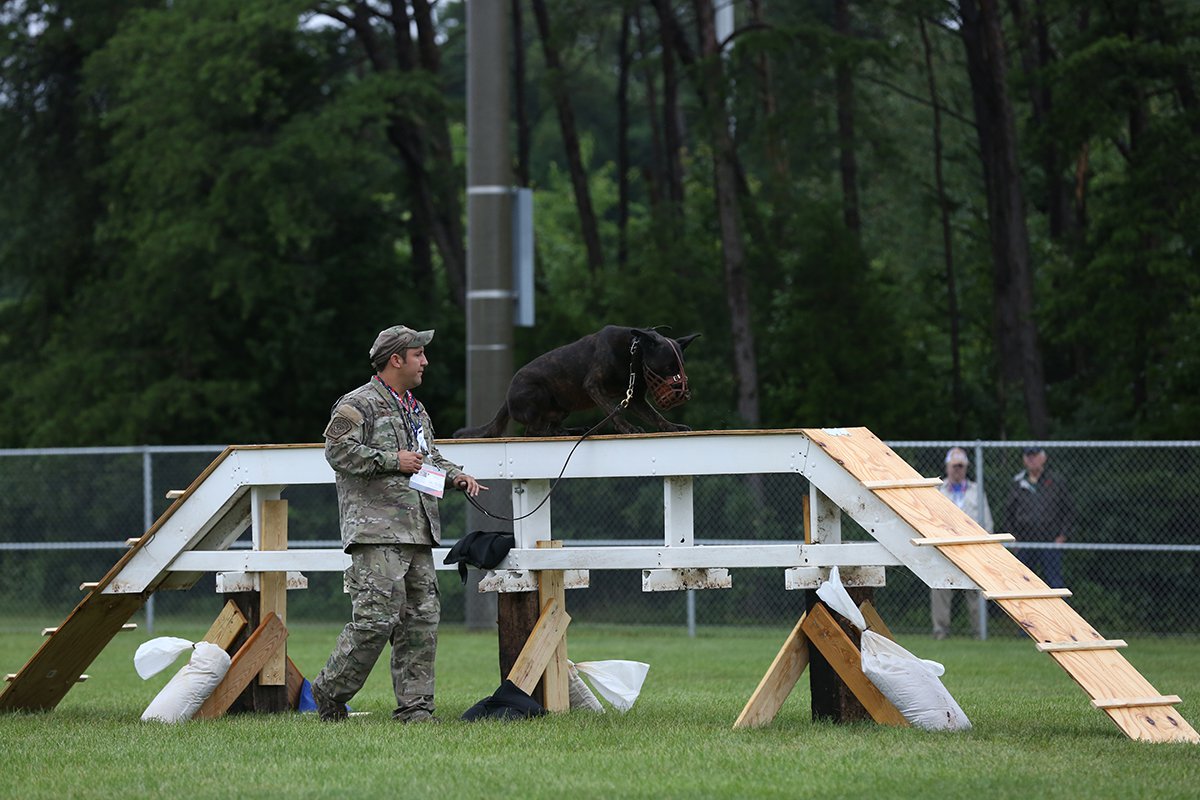
Part champion, maybe part fish
Life would be empty for Jim Vaughan without a pool. At an early age growing up in Washington, D.C., he grew fond of the water. After all, his mother was a swimming coach at George Washington University.
“My parents were into swimming big time,” he recalls.
So is Vaughan. In fact, many years later, he was rehired as the survival swim instructor at the Border Patrol Academy for a five-year term after retiring from the Border Patrol in 2002.
Now, Vaughan spends his time in the pool doing arduous 3,000-yard workouts sometimes four times per week. He covers that distance in a brisk hour and 15 minutes.
“It’s been a lifestyle for me all my life,” said Vaughan, who now lives in two places he calls home—Denver and Artesia, New Mexico.
When the 6-foot 5-inch, 205-pound swimmer represented the Border Patrol at the World Police and Fire Games, he hit the jackpot—four gold medals and two silver. Vaughan, 68, won the 200-meter freestyle and 50-meter backstroke and competed in two relay team events at the George Mason University pool.
Vaughan is a competition junkie. He represented the Border Patrol at the World Police and Fire Games in Dubai and Vancouver and he plans on competing in 2017 when Montreal hosts the games.
Vaughan also swims in the annual masters games, which he considers even more grueling. “Many of these competitors are former Olympians, people who never quit [training],” he said.
The masters events brought Vaughan to several cities over the years He placed 11th in the nation in the 50-meter freestyle held in Indianapolis in 2012.
When he isn’t competing or working out in Denver’s rarified elevation, Vaughan is on the speaking circuit, pitching leadership. “I’ll speak to any size group,” he said without any hesitation “I’ve been in front of 200 people.” He’s speaks to schools and volunteer organizations, drawing on his Border Patrol experience and his time in the Marine Corps, where he served during the Vietnam era as both an enlisted Marine and officer.
The aggressive Russian and Australian swimmers stood out the most during this year’s competition, said Vaughan. “They were tough.”
Some competitors have more than two legs
Take Basco and Billy. Basco is a Dutch shepherd who works with Agent Cruz Esquivel and Billy is a Belgian Malinois who works with Agent Noe Bazan. Bazan and Cruz are members of the Border Patrol’s Tactical Unit, or BORTAC, and dogs play an important role in mitigating the violent situations BORTAC units commonly face.
Both agents are also Border Patrol K-9 handlers who spend a lot of time with their four-footed companions.
How much time? Well, before a dog can work in the field—or have a shot at the service dog competition for that matter—the animal and handler work together through a 12-week behavior course at the Border Patrol’s canine center in El Paso, Texas. The training continues one day per week throughout the dog’s career, which can last up to seven years, according to Esquivel.
“We even take the dog home, to bond with them,” he said. “Between work and home, we spend more time with the dogs than our families.”
But when they entered the police service-dogs event all that investment of time and training paid off. The two agents brought home a combined 10 medals.
|
|
At Lake Fairfax Park, canine handlers competed their dogs in four categories: obedience, agility, handler protection and search. For the spectators, the competition went a long way in retiring some of the perceptions and myths surrounding police service dogs. The event proved dogs can do far more tasks than just charging and attacking. They also save lives.
The dogs navigated an obstacle course to show their agility. The obedience segment involved several command exercises, one that required dogs to stay in an area about 20 yards behind the handler for three minutes without moving.
Still, the competition wouldn’t be complete without attack demonstrations. A local canine handler in a protective suit played the bad guy. True to training, Billy exploded forward when unleashed. Within seconds, the dog caught up with the fleeing criminal, latching on to an arm. That made it easy for his handler Bazan to catch up and apprehend the subject.
Bazan and his dog Billy—the youngest dog in the competition—won a gold medal in the protection exercise.
Most of the dogs acquired by the Border Patrol are purchased from European breeding centers, said Bazan. Each breed has its advantages. For instance, the Dutch shepherd is noted for its endurance and obedience while the German shepherd is better suited for detection. The centers not only produce dogs with stable character and temperament, but with an ability to be aggressive when necessary, the “fight drive” as Bazan describes it.
From shot-put to shots
Jacob Frey was between sets of bench presses, trying to prove he was TCA—Toughest Competitor Alive. That swaggering, somewhat ominous title stood out among the constellation of other world games events. If it seemed a little intimidating, it really had the opposite effect—contestants packed the gym at Westfield High School in Chantilly.
TCA challenged even the toughest competitors. It was really several events in one: a 5K run, shot-put, 100-meter dash, 100-meter swim, rope climb, pullups, bench press and an obstacle course.
Frey knew all those events would make for a long day, so he arrived the night before from Harpers Ferry, West Virginia, to be ready and rested for the 7 a.m. to 6 p.m. TCA event.
During the bench press, Frey said he could request a certain weight and then attempt to lift it. Each weight station was surrounded by judges with clipboards who sat on folding chairs and documented each lift.
Frey, a supervisory Border Patrol agent assigned to the Firearms Training Branch, finished ninth in the TCA, “slightly better than I expected,” he said. “Not great, but not terrible.”
Frey switched gears from power to precision, entering the Police – Action Pistol event. He was one of five CBP shooters who took up the challenge, firing pistols at a variety of targets—some moving, some stationary. Contestants moved through four courses with up to 20 targets. Timing and accuracy were critical and it took from 40 seconds to a minute to get through each course, he explained “You had to keep moving from target to target and keep shooting,” he said. “Timing was key.” “I was using my duty gear, while most competitors had specialized guns and equipment,” said Frey.
Frey placed 59th out of 130 shooters.



